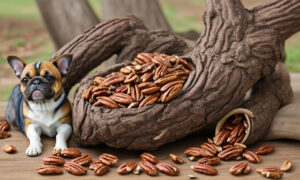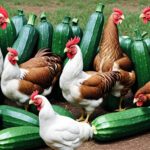When it comes to feeding chickens, backyard poultry enthusiasts often ponder about the safety of various human foods, such as fruits, which they can share with their feathered friends. One such common curiosity revolves around the question: can chickens eat grapes? And yes, the answer lies in the fact that not only can chickens eat grapes, but these small, fleshy fruits can also be a nutritious supplement to their diet. In this in-depth exploration, we will uncover the surprising benefits of grapes as a part of a balanced diet for your chickens and how to feed them properly to ensure their health and happiness.
Nutritional Profile of Grapes: A Boon for Chickens
Grapes are a bountiful source of vitamins, minerals, and other bioactive compounds, which makes them an enticing and valuable addition to your chickens’ diet. Here’s why grapes are more than just a tasty treat:
Vitamins and Antioxidants in Grapes
- Vitamin C: With their vitamin C content, grapes can help bolster the immune system of your chickens, as this essential vitamin serves as a strong antioxidant.
- Vitamin K: Essential for proper blood clotting and bone health, vitamin K is another present in grapes that benefits your poultry.
- Antioxidants: Grapes are packed with antioxidants like resveratrol, flavonoids, and tannins, which protect the chickens from cellular damage and support overall health.
Essential Minerals Found in Grapes
- Potassium: Essential for muscle function and heart health, potassium is a critical mineral that chickens can derive from grapes.
- Magnesium: Important for enzyme function and the skeletal structure, magnesium also makes grapes beneficial for your flock.
- Calcium: Although present in smaller amounts, calcium is vital for eggshell strength and the overall skeletal health of the chicken.
Fiber: A Digestive Aid
Grapes also contain dietary fiber, which is crucial for the digestive health of chickens. A moderate amount can help their digestive system move smoothly but should be balanced to prevent any digestive upset.
Energy Source: Natural Sugars
The natural sugars present in grapes, such as fructose, provide chickens with a quick and healthy energy boost, especially useful during active and foraging periods.
Grapes: A Healthy Treat or a Hazard?
While grapes hold a plethora of benefits, one might ask, are there any dangers in feeding chickens grapes? Grapes should be given in moderation to avoid potential risks.
Potential Risks when Overfed
- Sugar Content: Grapes have a high sugar content, which can lead to obesity and related health issues if chickens are overfed.
- Pesticide Exposure: Non-organic grapes may contain pesticides that could be harmful to your chickens. Always choose organic grapes or wash them thoroughly.
- Choking Hazard: If not appropriately prepared, grapes can pose a choking hazard particularly to smaller breeds or younger chickens.
The Seeds Debate
Some argue that grape seeds could cause harm due to potential toxins. However, there’s limited evidence to suggest that grape seeds are toxic to chickens. It’s generally considered safe to feed chickens grapes with seeds, but as a precaution, you may opt for seedless varieties.
Feeding Chickens Grapes: Best Practices
Knowing the advantages and potential risks of feeding chickens grapes, how can you introduce this fruit into their diet safely? Here’s a guide to best practices in feeding grapes to your flock.
Portion Control: Moderation is Key
Always remember that grapes should be considered a treat, not a staple in the diet of your chickens. Treats, in general, should not exceed 10% of their total daily food intake.
Preparation Techniques
- Slicing or Halving: To prevent choking, it’s wise to cut grapes into smaller pieces, especially when serving to smaller chickens or chicks.
- Mix with other Foods: Combining grapes with other safe fruits and vegetables can create a diverse and exciting treat mix for your chickens.
Frequency and Amount
- Feed grapes in small quantities – a few grapes per chicken a couple of times a week is sufficient.
Organic vs. Non-Organic
- Where possible, choose organic grapes to minimize pesticide exposure. If non-organic grapes are your only option, ensure you wash them thoroughly before feeding them to your chickens.
Unveiling the Surprising Benefits of Grapes for Chickens
While we’ve touched upon the nutritional merits of grapes, it’s time to delve deeper into their surprising benefits.
Strengthening Immune Systems
Vitamin C and antioxidants play a pivotal role in enhancing the immune systems of chickens, making them more resilient against diseases.
Supporting Digestive Health
The fiber in grapes is beneficial for the digestive health of chickens, as it helps with maintaining regular bowel movements and preventing constipation.
Promoting Healthy Feathers
Antioxidants in grapes are believed to support the health of chickens’ feathers, which is vital for insulation and protection from the elements.
Encouraging Natural Behaviors
Introducing grapes into the diet allows chickens to exhibit their natural pecking and foraging behaviors, which enriches their environment and reduces stress.
Do’s and Don’ts of Feeding Grapes to Chickens
When incorporating grapes into your chickens’ diet, keep in mind these important do’s and don’ts.
Do:
- Offer grapes as an occasional treat.
- Wash grapes thoroughly before serving.
- Cut grapes into appropriate sizes to prevent choking.
- Monitor your chickens for any adverse reactions when trying grapes for the first time.
Don’t:
- Overfeed grapes to your chickens due to their high sugar content.
- Disregard the rest of the balanced diet that chickens require.
- Neglect to provide fresh water when offering grapes or any other treats.
Final Thoughts: A Grape Addition to a Balanced Diet
In concluding this comprehensive guide to feeding chickens grapes, it’s clear that when offered appropriately, grapes can be a delightful and nutritious treat for your chickens. They offer an array of health benefits that can contribute positively to the well-being of your backyard flock.
By understanding the nutritional value and adhering to the feeding guidelines provided, you can safely incorporate grapes into the diverse diet of your chickens, ensuring you maximize the health benefits while minimizing any risks. So next time you find yourself pondering, "can chickens eat grapes?" you can confidently reply with an emphatic yes, and with the knowledge of how to do so responsibly.
Remember, like all treats, grapes should be a part of a balanced diet. A variety of grains, vegetables, fruits, and a constant supply of fresh water should always form the basis of your chickens’ diet. With this approach, you’ll have the satisfaction of knowing you’re providing your feathered friends with the best care and nutrition available, cementing your role as a responsible and informed poultry owner.







